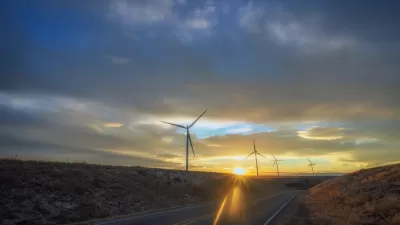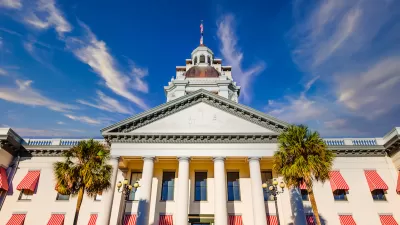The years-long permitting process for new transmission lines is slowing the state’s shift to clean energy.

In an article in Governing, Ari Plachta argues that the complex permitting process for building new power lines in California is holding back the state’s clean energy sector.
Plachta explains the growing need for electricity in California, where “climate change is driving an increased demand for electricity, due to extreme weather and electrification of homes and cars” and peak demand is expected to double by 2040. “Without enough power lines, California will fall short of its goal to supply 100 percent clean energy by 2045.”
Several agencies estimate that the state’s grid will need to roughly triple its transmission capacity by 2050, but adding capacity is increasingly costly and time-consuming. “[I]n 2022, a long-distance transmission line faces a six-to-ten-year journey through California’s regulatory system.” Meanwhile, transmission lines can cost millions of dollars per mile, “making cost a source of contention between renewable energy developers and utilities.”
Projects are also sometimes delayed by community opposition, Plachta adds. “Whether it’s from suburban homeowners concerned about property values or indigenous tribes protecting cultural resources, advocates hope to find a public that’s more receptive to clean energy infrastructure development.” But industry experts say major reforms are needed to meet the state’s clean energy goals and the growing demand for electricity.
FULL STORY: It Takes too Long to Build New Power Lines in California

Planetizen Federal Action Tracker
A weekly monitor of how Trump’s orders and actions are impacting planners and planning in America.

Restaurant Patios Were a Pandemic Win — Why Were They so Hard to Keep?
Social distancing requirements and changes in travel patterns prompted cities to pilot new uses for street and sidewalk space. Then it got complicated.

Map: Where Senate Republicans Want to Sell Your Public Lands
For public land advocates, the Senate Republicans’ proposal to sell millions of acres of public land in the West is “the biggest fight of their careers.”

Maui's Vacation Rental Debate Turns Ugly
Verbal attacks, misinformation campaigns and fistfights plague a high-stakes debate to convert thousands of vacation rentals into long-term housing.

San Francisco Suspends Traffic Calming Amidst Record Deaths
Citing “a challenging fiscal landscape,” the city will cease the program on the heels of 42 traffic deaths, including 24 pedestrians.

California Homeless Arrests, Citations Spike After Ruling
An investigation reveals that anti-homeless actions increased up to 500% after Grants Pass v. Johnson — even in cities claiming no policy change.
Urban Design for Planners 1: Software Tools
This six-course series explores essential urban design concepts using open source software and equips planners with the tools they need to participate fully in the urban design process.
Planning for Universal Design
Learn the tools for implementing Universal Design in planning regulations.
Heyer Gruel & Associates PA
JM Goldson LLC
Custer County Colorado
City of Camden Redevelopment Agency
City of Astoria
Transportation Research & Education Center (TREC) at Portland State University
Camden Redevelopment Agency
City of Claremont
Municipality of Princeton (NJ)





























